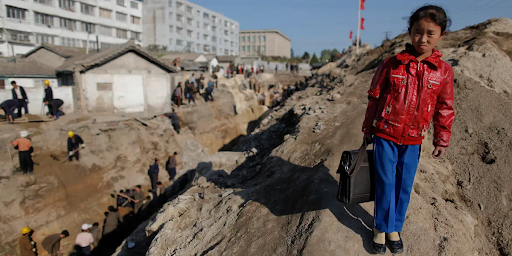Little did we know in 2010 that within 10 years North Korea will become one of the most dangerous and repressive nations in the world. The country has about 24 million people living in totalitarian states with complete isolation that is no interaction with the outside world.
Foreign media is banned, interaction with tourists is tightly controlled, and the internet is off-limits to almost everyone. The shock is not yet over the college students there had never heard of Nelson Mandela. And the outside world is often unaware of what is going on in the country, and its leaders can “disappear” from public view for weeks. These things are the everyday shenanigans of the country.
While preventing North Koreans from leaving the nation and communicating with the outside world, the North Korean government maintains frightened obedience among the populace by using prison camps, torture, forced labor, threats of execution, and arbitrary punishment.
You must have heard the news of the execution of two teens in North Korea for allegedly watching and distributing South Korean and American movies. 16 and 17-year-old boys were executed by firing squad in front of onlookers who viewed their crime as “evil.” According to reports, the murder took place in October. But the word of the two lads’ death from watching and sharing K-dramas only recently spread.
North Korea: The Hikikomori
North Korea‘s nuclear weapons program and record of egregious human rights abuses have turned the country into a global outcast. Moreover, international sanctions have further isolated the country’s centralized socialist economy. Its poverty has been made worse by Pyongyang’s failed economic policies.
North Korea is a mysterious and unknowable place. Its population has grown to 25 million since 1948. Poverty is pervasive due to its economic structure and lack of involvement in the global economy. About 60% of people there are considered to be poor.

A command economy, which is typical of communist nations, exists in North Korea. Because the government controls all financial transactions, there is little commercial rivalry, which keeps the economy from growing too quickly. The economy has also been severely harmed by trade restrictions and sanctions. The absence of participation has so effectively prevented the nation from expanding within the global market. North Korea’s poverty rates are rising and its economy is susceptible to collapse.
This is a clear example of the country’s chronic underdevelopment compared to the rest of the region. This is how North Korea became a hikikomori (A Japanese word that means “to pull back” and “shut oneself in”). It is a story that is of both ancient tradition and the bloody geopolitics of modern times.
The history of isolation
North Korea has a long history of self-isolation. Even before the Korean peninsula was split into two countries in the 20th century. The Joseon Dynasty, which ruled South Korea from the 14th century to the early 20th century, isolated the country from the outside world to prevent foreign invasion and to believe in the supremacy of Confucian culture. Contact with foreigners and overseas travel were prohibited. And after a series of invasions, the Korean ruler even restricted exchanges with neighboring countries China and Japan.
When Japan lost World War II, Korea was divided into US-Soviet territories. This arrangement was temporary. However, the United States and the Soviet Union never reached a permanent agreement, resulting in two separate governments.
North and South Korea, supported by their respective allies, went to war in 1950 amid Cold War tensions and territorial concerns. The Korean War was disastrous; American bombing strikes leveled most of North Korea, leaving only one structure in the city. The North felt vulnerable and surrounded. As a result, Kim Il-sung, the then-leader of North Korea developed the theory of independence. It remains the official ideology of the country to this day.
He established his three principles: Political independence, economic autonomy, and military autonomy. This political stance has led to North Korea becoming a truly reclusive kingdom. This policy was also used by the regime to maintain its isolation from other socialist states. And to justify the cult of personality of its leaders.
After China made peace with the West and the subsequent collapse of the Soviet Union, North Korea found itself more isolated than ever. In the late 1990s, South Korea’s relations with the West appeared to be unraveling. Although the following year, it withdrew from the Nuclear Non-Proliferation Treaty, revealing its possession of nuclear weapons.
The maybe future…
Predictions about the future of North Korea are notoriously unreliable, as little information is available about what the North Korean leadership thinks.
Likely, the regime will eventually collapse and South Korea will absorb North Korea. It’s said that the rising market activity, foreign intelligence infiltration, and internal strife could destabilize the regime. But when will it collapse? North Korea has other possible directions. As Beijing could intervene in the crisis and establish a pro-China government or try to spur economic development even if the leadership survives. There are some hopeful signs that it may be rethinking its isolationism (despite an ongoing border flare-up).
Some are seeing signs of a glamor attack on the West, and Japan and Russia are spotting it too. An opportunity to improve relationships. China, North Korea’s only ally, has become increasingly frustrated with North Korea’s belligerence. North Korea lost some of Beijing’s protections and partially shielded the country from international pressure. It increases the possibility.
But serious problems remain, according to Choi Jin-Wook, a senior North Korean researcher at the Institute for Korean Unification in Seoul. “They want to talk to the US, they want outside help, they want to get out of the blockade and stagnation, but they don’t want to give up their nuclear weapons,” Jin-Wook said.
-DEEPALI CHATNANI AND VANSHIKA
Informative